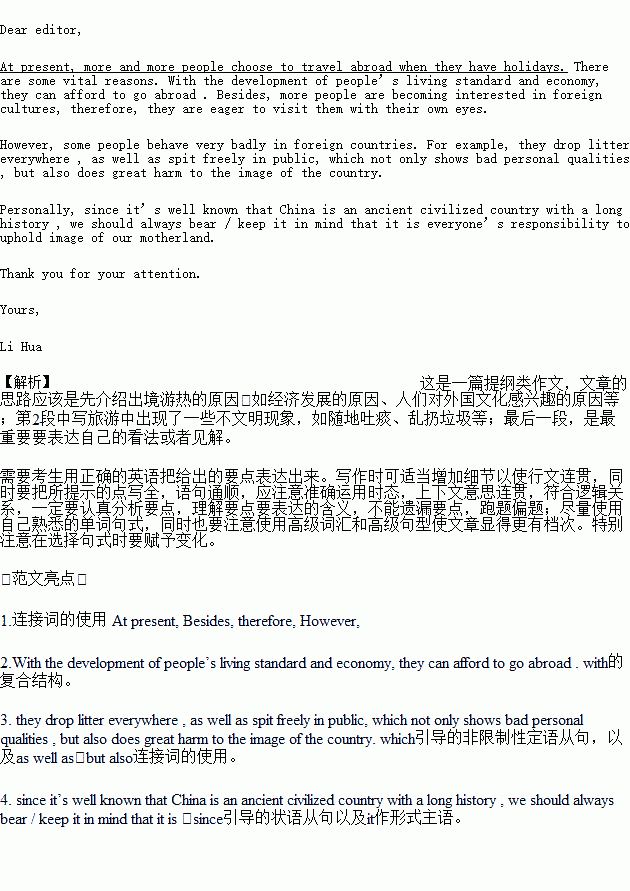ÌâÄżÄÚÈĘ
ŒÙÈçÄăÊÇÀî»ȘŁŹŐë¶ÔÎÒčúŒÙÆÚŃĄÔńłöčúÂĂÓΔÄÈËÔœÀŽÔœ¶àŁŹ”«ÓĐ”ÄÓÎżÍÓĐČ»ÎÄĂśĐĐÎȘ”ÄÏÖÏóŁŹÇëžű21st Century Teens±àŒČżĐŽÒ»·âĐĆĄŁÄÚÈĘĐèÒȘ°üÀšÒÔÏÂÒȘ”ă:
1.łöŸłÓÎÈÈ”ÄÔÒòŁŹÈçŸŒĂ·ąŐč”ÄÔÒòĄąÈËĂǶÔÍâčúÎÄ»ŻžĐĐËÈ€”ÄÔÒò”ÈŁ»
2.ÂĂÓÎÖĐłöÏÖÁËÒ»Đ©Č»ÎÄĂśÏÖÏóŁŹÈçËæ”ŰÍÂÌ”ĄąÂÒÈÓÀŹ»ű”ÈŁ»
3.Äă”ÄÌŹ¶ÈșÍżŽ·šĄŁ
ŚąÒâŁș1.ŽÊÊę100ŚóÓÒ
2.¶ÌÎÄżȘÍ·œáÎČÒŃžűłöŁŹČ»ŒÆÈëŚÜŽÊÊꣻ
3.żÉÊÊ”±ÔöŒÓÏžœÚŁŹÒÔÊčĐĐÎÄÁŹč᣻
ČÎżŒŽÊ»ăŁșČ»ÎÄĂśĐĐÎȘŁșimmoral behaviors ÊśÁąĐÎÏóŁșuphold an image
Dear editor,
At present, more and more people choose to travel abroad when they have holidays.
____________________________________________________________________________________________
____________________________________________________________________________________________
____________________________________________________________________________________________
____________________________________________________________________________________________
____________________________________________________________________________________________
____________________________________________________________________________________________
____________________________________________________________________________________________
____________________________________________________________________________________________
_____________________________________________________________________
Thank you for your attention.
Yours,
Li Hua
 ÖÇ»ÛĐĄžŽÏ°Ï”ÁĐŽđ°ž
ÖÇ»ÛĐĄžŽÏ°Ï”ÁĐŽđ°ž
